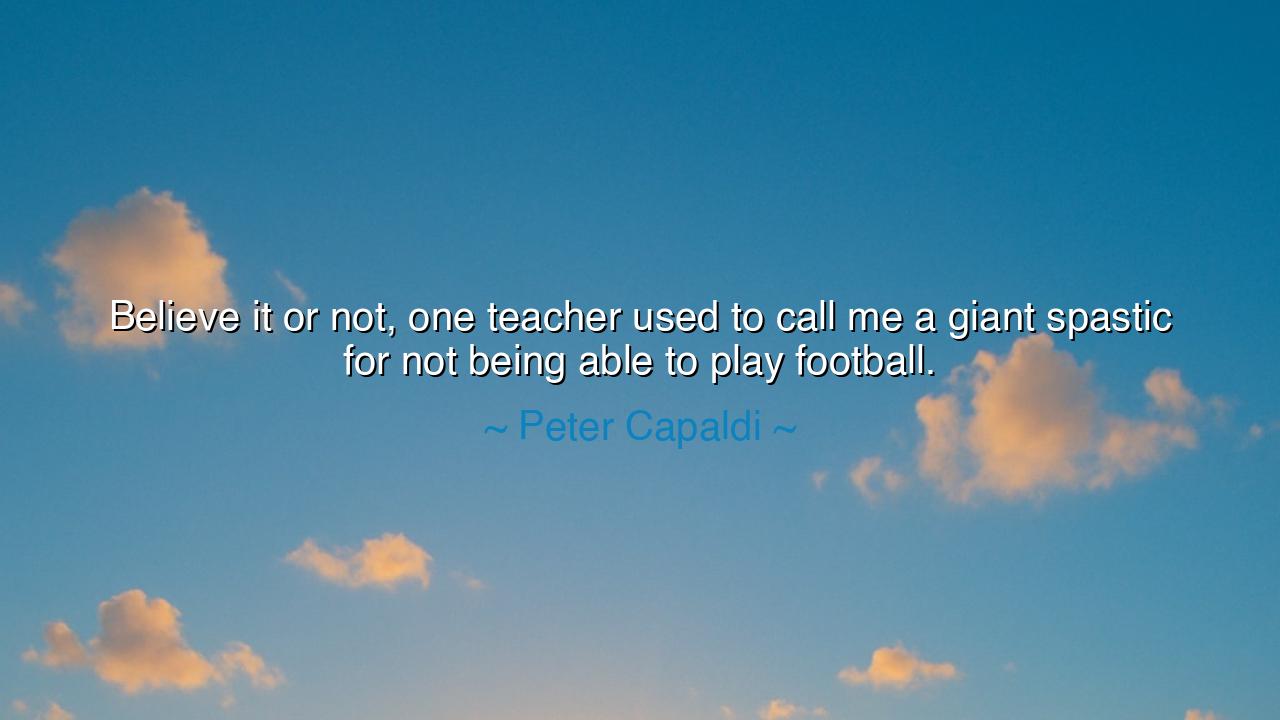
Believe it or not, one teacher used to call me a giant spastic
Believe it or not, one teacher used to call me a giant spastic for not being able to play football.






The actor Peter Capaldi, known across the world for his roles upon stage and screen, once confessed with sharp honesty: “Believe it or not, one teacher used to call me a giant spastic for not being able to play football.” In this recollection lies a wound, but also a lesson of endurance. For here we see how words, spoken carelessly by one entrusted with the sacred duty of teaching, can cut more deeply than any blade. Yet we also see that such wounds, though painful, need not define a soul forever—they can be overcome, even transformed, into strength.
To be mocked by a teacher is no small thing. A teacher is meant to be a guide, a nurturer of potential, a defender of the weak. When instead they become the source of ridicule, the betrayal is profound. For children are tender, and words spoken in youth echo across decades. Capaldi’s teacher saw only what he could not do—he could not master football—and so he reduced him to an insult, blind to the gifts that lay hidden within. This is the danger of narrow vision: to measure all students by one standard, and to crush those who do not fit it.
Yet history has shown that many who were ridiculed in youth later became giants of another kind. Albert Einstein was dismissed as slow in school, Winston Churchill was told he would never succeed, and countless artists, thinkers, and leaders were mocked for failing to match the standards of their day. Like Capaldi, they bore the sting of scorn, yet their worth was not in the games they could not play, but in the voices they carried, the visions they revealed, and the courage with which they stood. What one teacher called a weakness, the world would one day recognize as genius.
The cruelty of Capaldi’s story also warns us of the power of words. A single careless insult can lodge in the heart and stay there for years. How many souls have been silenced, how many gifts never awakened, because the young were told they were foolish, clumsy, or worthless? And yet, the reverse is also true: a single word of encouragement can kindle a fire that lasts a lifetime. The same authority that can wound can also heal. Thus, the responsibility of every teacher, every leader, every parent is to wield words with care, knowing that they are tools of creation or destruction.
But Capaldi himself embodies the triumph over such wounding. Though mocked as a “giant spastic,” he rose to become an actor of depth and renown, portraying Shakespearean kings, modern heroes, and the timeless Doctor Who. Football was not his destiny—storytelling was. The insult hurled at him was rooted in blindness, for the teacher could not see beyond the field of sport. Yet Capaldi proved that greatness is never defined by conformity, but by authenticity, by following one’s true gift regardless of mockery.
The lesson for us is clear: never allow the scorn of others to define you. If mocked for what you cannot do, turn instead to what you can. If belittled for not fitting a mold, remember that you were not made for molds—you were made for uniqueness. And if you are entrusted with the lives of the young, let your words build rather than break, lift rather than crush. For in every child there is a seed of greatness, and it is the sacred task of teachers and elders to nurture it, not destroy it.
Practically, let us take this wisdom into our own lives. When you speak, ask: does this word wound or strengthen? When you teach, remember that not all gifts are alike—some children will not play football, but they may write symphonies, paint visions, or lead nations. And when you are ridiculed, carry this truth in your heart: the world’s insults are often poor prophecies, and the path of your destiny lies not in their judgment, but in your courage to walk your own way.
Thus, Capaldi’s story becomes not one of bitterness, but of victory. The insult of a teacher could not bind him; instead, he rose beyond it. And so too can we. For though the words of others may sting, they cannot chain the soul that knows its worth. And in this lies the heroic truth: our destiny is not written by mockery, but by perseverance, vision, and the courage to become who we are meant to be.






AAdministratorAdministrator
Welcome, honored guests. Please leave a comment, we will respond soon